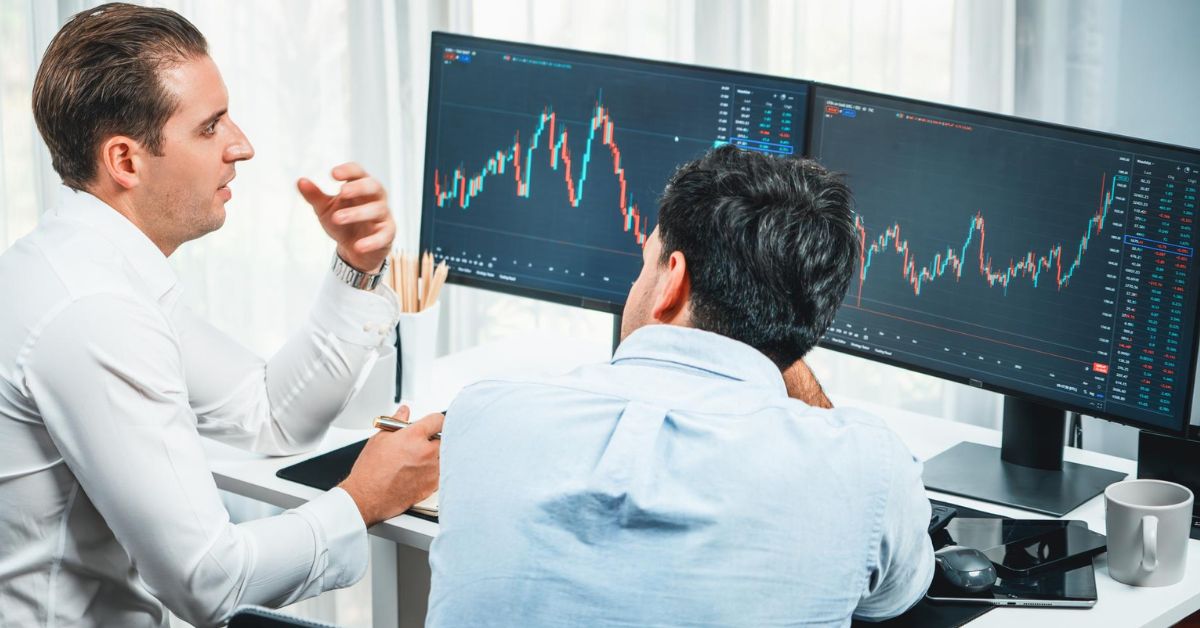Often, trading psychology determines success or failure in the financial markets. The psychological aspect of trading can have a more significant effect on your overall performance than technical analysis and market research. Long-term success in trading requires understanding and controlling your emotions, biases, and mindset.
In this blog post, we’ll explore trading psychology, pitfalls, and practical strategies to help you develop a disciplined and resilient trading mindset. Whether you’re a novice or an expert, mastering these psychological aspects will improve your trading.
Platforms like Prime XBT offer traders a reliable environment to execute trades with confidence. The platform combines powerful trading tools with a focus on user experience to help traders maintain discipline and emotional control. So, join PrimeXBT today! Use promo code PRIMEOTT to receive a +7% bonus on your deposit.
The Core Concepts of Trading Psychology

The psychology of trading includes the mental and emotional factors that influence a trader. These core concepts will help traders manage their emotions and develop a disciplined approach.
Fear and Greed
Fear and greed are two of the most powerful emotions that drive trading decisions. The fear of losing money often leads traders to make impulsive decisions, such as exiting a position too soon or avoiding trades altogether.
Conversely, greed can cause traders to hold onto positions too long, hoping for even bigger profits or overleverage in pursuit of quick gains. To become more balanced and rational, you need to understand how fear and greed affect your trading behavior.
Overconfidence and Impulse Control
Overconfidence can be a significant obstacle in trading. Traders who have a string of successful trades may think their success is guaranteed, leading to riskier decisions. This overconfidence can cloud judgment, making it challenging to recognize market changes that could impact trades.
Impulse control is also essential—resisting the urge to make hasty decisions based on short-term market movements. Maintaining a level-headed approach is necessary for long-term success.
Loss Aversion
Loss aversion refers to the tendency to prefer avoiding losses over acquiring equivalent gains. It can manifest as a reluctance to close losing positions, hoping the market will turn around, or an aversion to taking risks after a loss.
This behavior can lead to missed opportunities and increased losses. The key to overcoming loss aversion and making more objective trading decisions is recognizing its impact on your decision-making process.
The Role of Stress in Trading
Trading can be an inherently stressful activity, especially during volatile market conditions. Stress can impair judgment, leading to poor decision-making and increased risk-taking.
You should recognize when stress is affecting your trading performance and take steps to manage it. Taking deep breaths, taking regular breaks, and maintaining a healthy work-life balance can help reduce stress and improve focus.
Common Psychological Biases in Trading

Psychological biases are believed to result in systematic errors in judgment and decision-making. In trading, these biases can skew perception and lead to suboptimal outcomes. Traders need to identify and understand these biases so they can mitigate their influence.
Confirmation Bias
Basically, confirmation bias occurs when you seek out information that supports your beliefs while ignoring or downplaying evidence that contradicts them. If you only pay attention to news and data that fits your outlook, this can lead to a skewed analysis and poor trading decisions. Before making a trade, it’s essential to look at all the relevant information and seek out opposing viewpoints.
Anchoring Bias
In anchoring bias, traders focus too much on one piece of information, the first piece they see when making decisions. For example, a trader may fixate on the price at which they bought a stock, using it as a reference point even when the market has shifted.
It can lead to holding onto losing positions for too long or setting unrealistic profit goals. Traders should continuously reassess their positions based on current data and explore the broader market context.
The Bandwagon Effect
Because of the bandwagon effect, traders often make decisions based on popular trends rather than independent analysis. When markets are volatile, following the herd can lead to entering or exiting trades at the wrong time. Instead of following the crowd, traders should do their research and analysis, making decisions based on logic.
Recency Bias
Recency bias is the tendency to give more weight to recent events or experiences when making decisions. In trading, this can lead to overestimating the significance of recent market movements and underestimating longer-term trends.
For example, after a streak of gains, a trader might become overly optimistic about future performance, ignoring the possibility of a downturn. When making decisions, traders should consider both recent developments and historical data to counteract recency bias.
How to Improve Trading Psychology

A key aspect of improving trading psychology is to put concepts into practice as much as possible. With the right strategies, traders can learn to control their emotions, make better decisions, and approach markets consistently. Here are some practical techniques to improve your trading psychology:
Keeping a Trading Journal
One of the most effective ways to improve your trading psychology is to keep a trading journal. By documenting your trades, including your rationale, emotions, and results, you can learn from them.
Over time, a journal can reveal tendencies like impulsive decisions or overtrading, helping you to address these issues. Reviewing your journal regularly will help you learn from both your successes and mistakes.
Meditation and Mindfulness
Meditation and mindfulness practices can significantly enhance your focus and emotional control in trading. Meditation helps calm the mind, reducing stress and anxiety, which are common in trading environments.
Being mindful allows you to recognize emotional reactions as they arise and prevent them from affecting your decisions. Meditation or mindfulness exercises can give you a clearer, more focused trading mindset.
Developing a Trading Plan
A well-defined trading plan is essential for maintaining discipline and reducing emotional decision-making. Make sure your trading plan includes your risk tolerance, entry and exit strategies, position sizing, and when you should adjust or exit.
A clear plan will keep you from making impulsive decisions based on market fluctuations. Keeping your plan in mind, especially during high volatility periods, ensures your trading is based on strategy.
Setting Realistic Expectations
Setting unrealistic expectations, such as expecting to get rich quickly or never lose money, is a common mistake in trading. These expectations can lead to frustration, stress, and poor decision-making.
It’s important to set achievable goals based on your experience level, market conditions, and risk tolerance. It’s important to realize that trading isn’t all fun and games and that consistent, incremental gains are more sustainable.
Building Resilience
Resilience is the ability to bounce back from setbacks and continue moving forward despite challenges. In trading, resilience is crucial because the market can be unpredictable, and even the best traders experience losses.
When you build resilience, you develop coping mechanisms to cope with stress and setbacks, like taking breaks, learning from mistakes, and staying on track. It’s important for traders to have a resilient mindset so they can weather the market’s ups and downs.
Taking Breaks and Managing Burnout
Trading can be mentally exhausting, especially during periods of high stress or prolonged market activity. To prevent burnout, it’s essential to take regular breaks and step away from the screen when needed.
To maintain a healthy work-life balance, it’s important to schedule time for relaxation and other activities outside of trading. By managing your energy levels, you can improve your focus, decision-making, and trading performance.
Continuous Learning and Adaptability
The markets are constantly evolving, and so should your trading strategies and mindset. Continuous learning and adaptability are essential for staying ahead in trading.
It involves updating your knowledge regularly, learning from your failures and successes, and changing your strategies as conditions change. Continuous improvement helps you adapt to new challenges and opportunities, making your trading more successful.
The Role of Mentorship and Community
It’s easy to feel solitary when trading, but mentorship and community can be invaluable resources. Keeping a healthy trading mindset requires guidance, accountability, and a sense of belonging, all of which come from talking to others.
Finding a Trading Mentor
A trading mentor can play a pivotal role in your development as a trader. Mentors provide personalized guidance to help you navigate the market’s complexities and avoid common pitfalls.
At On Tilt Trading, we provide private coaching sessions designed to enhance your trading journey. We’ll help you refine your strategies, manage your emotions, and develop a disciplined trading approach. So, check out On Tilt Trading Store and use promo code OTT10 to receive 10% off your order today.
Joining Trading Communities
Participating in trading communities can benefit traders by connecting with them, exchanging ideas, and gaining different perspectives. These communities can also be a source of motivation and support, especially during challenging times.
You can feel less isolated and more confident if you talk to people facing similar challenges. Furthermore, joining a community can expose you to new strategies and approaches you might not have considered otherwise.
Sharing Experiences and Learning from Others
Having a mentor or being a part of a trading community allows you to share and learn from others’ experiences. Discussing successful and unsuccessful trades can provide valuable insight and show you where you can improve.
If you learn from others’ experiences, you can avoid mistakes and refine your trading strategies. This collaborative learning approach will help you stay on top of your game and develop a strong trading mindset.
Conclusion
Trading psychology is essential for long-term success in the markets. Manage your emotions, biases, and mindset to make better trading decisions and stay disciplined. Whether you’re just starting out or looking to refine your strategies, focusing on the psychological aspects of trading will help.
So, do you want to stop losing money because of panic selling, FOMO, overtrading, and bag holding? We recommend the Vestinda trading app to eliminate emotional decision-making with automated crypto trading strategies. Streamline your trades and boost your confidence when Vestinda handles the emotions for you.



